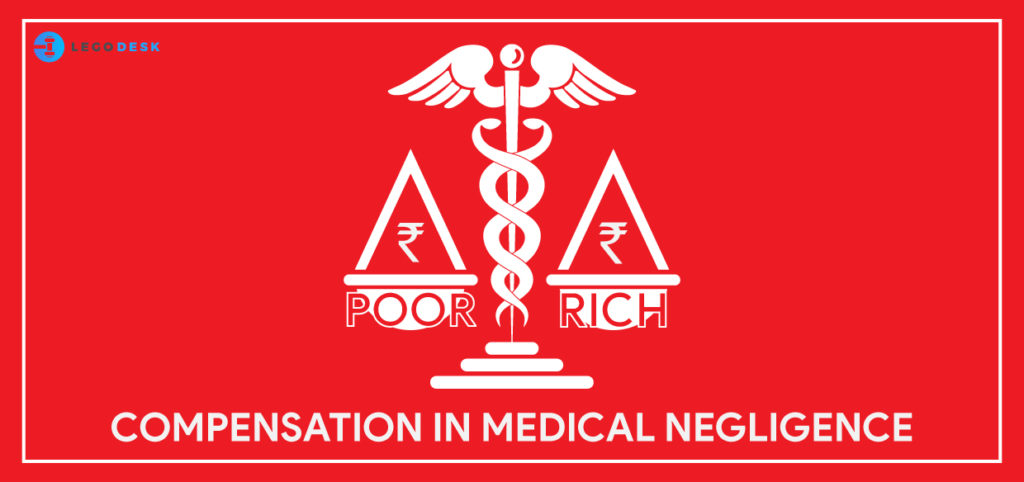Compensation in Medical Negligence
Introduction
The apex court in a judgment made it clear that that the compensations in the cases of medical negligence would not be less for the ones who are from the poor and rural background.
The need for the Judgment
The Supreme Court of India passes this judgment on hearing the appeal of a woman who due to the medical negligence had to amputee her right arm. She went for the compensation to the National Consumer Disputes Redressal Commission. The commission seeking the case as a case of medical negligence gave her the compensation of Rs. 2, 00,000/-. As the amount of the compensation was low, she went to the Supreme Court filing an appeal regarding the increase of the amount given by the National Commission. In addition to the grant given by the National Commission, the State Commission allowed the compensation of Rs. 2,93,526/-.
Observations of the bench
The bench of the Supreme Court, in this case, consisted of Justice A.M. Sapre and Justice Dinesh Maheshwari. They observed that in the cases of medical negligence the compensation provided should be adequate for the person seeking it. Mark Tiernan medical negligence solicitors will prepare the legal documents needed for the compensation. It should not be based on the financial conditions of the person. The poor and the people residing in rural areas must not be discriminated against.
In this case of Shoda Devi v. DDU/ Ripon Hospital Shimla & Ors.[1] The Apex court suggested the case of in the case of Alfred Benedict v. Manipal Hospital[2], where, for the reason of medical negligence, a 2-year-old girl developed gangrene in right arm which resulted in its amputation, this Court, considering the age of the child and her life-long suffering, be it her education or marriage prospects, awarded a lump sum of Rs. 20, 00,000/- as compensation.
Views of the Court
The bench said that “The case of an injured and disabled person is pitiable and the feeling of hurt and helplessness enures every day. The support that is needed by a severely handicapped person comes at an enormous price. Not only on the victim but even more so on his family and attendants and destroys their equanimity. We can also visualize the anxiety of the complainant and his parents for the future after the latter. We have therefore computed the compensation keeping in mind that his brilliant career has been cut short. The compensation will ensure a steady and reasonable income to him for a time when he is unable to earn for himself.”
Views on the decision of the National Tribunal
The judges while observing the grants made by the National Commission said, “We are constrained to observe that the National Commission, even after appreciating the troubles and trauma as also disablement and disadvantage suffered by the appellant, had been too restrictive in an award of compensation.”
The judgment of the court
The Judges were of the view, “We are constrained to observe that the National Commission, even after appreciating the troubles and trauma as also disablement and disadvantage suffered by the appellant, had been too restrictive in an award of compensation. Ordinarily, the general damages towards pain and suffering as also the loss of amenities of life. These deserve to be considered uniformly for human beings. The award of compensation cannot go restrictive when the victim is coming from a poor and rural background. Rather, in a given case like that of the appellant, such a background of the victim may guide the adjudicatory process towards a reasonably higher amount of compensation (of course, after having regard to all the attending circumstances).”
The bench also discussed the purpose it would serve. The Court said that “Such granting of reason-ability higher amount of compensation in the present case appears necessary to serve a dual purpose. Firstly to provide some succour and support to the appellant against the hardship and disadvantage due to amputation of the right arm. secondly, to send the message to the professionals that their responsiveness and diligence has to be equibalanced for all their consumers. In addition to this, all human beings must be treated with equal respect and sensitivity.
Conclusion
To conclude the bench granted a sum of Rs. 10,000 above and over the grant the National and the State Commission provided. The time period of 3 months is provided. If the commission failed to supply such amount then the new rate would increase by @6% P.A.
[1] CIVIL APPEAL NO. 2557 OF 2019.
[2] (2015) 11 SCC 423.
Try our Debt Resolution solutions today Request a Demo
